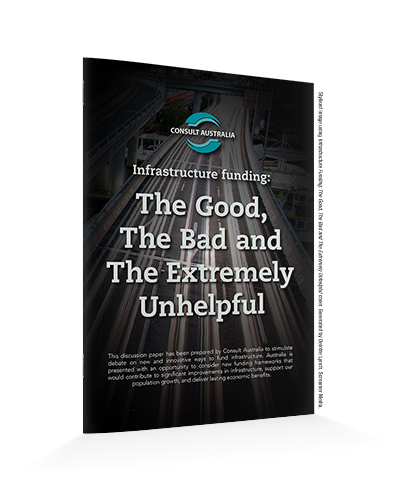Consult Australia wants government to capitalise on low cost of borrowing.
BUILT ENVIRONMENT industry body – Consult Australia, representing 49,000 consulting firms – is calling on governments to overcome the financial obstacles that prevent infrastructure development.
The Good, the Bad, and the Extremely Unhelpful report, published by Consult Australia, urges government to embrace debt, utilise value capture as a fair form of finance, recycle assets, develop road-user charging and develop policy to grow private sector investment. 
“Infrastructure is a tool that turns short-term debt into future surplus by increasing productivity,” Consult Australia CEO Megan Motto said. “With a triple-A credit rating and historically low bond rates there has never been a better time to invest in infrastructure, for this generation to take responsibility for the next by utilising low borrowing costs and investing in future economic growth.
“Our discussion paper seeks to showcase existing financing options, stimulate debate about future financing options, and above all, impress on leaders the opportunity of now.”
Along with making better use of existing infrastructure assets through better urban planning or privatisation, the paper also suggests options for taxation reform, public finance, private finance and integrated funding frameworks.
Consult Australia’s report calls for:
Taxation Reform including hypothecation; ensuring users contribute the full costs of their travel choices; environmental impact charges covering congestion or emission; demand-sensitive transport pricing; and rebalancing capital investment against recurrent expenditure.
Public Finance including Tax Incremental Financing to generate and use tax from increasing property values; Employer Transport Levies to fund the transportation of employees to work; Green Banking to grow contributions towards environmentally sensitive developments; and Infrastructure Bonds to provide access to large pools of retail investment funds like superannuation.
Private Finance including Direct Tolling of new infrastructure involving user-charging; Private-Public Partnerships, alliance contracting and rebalanced risk sharing; and Land Value Capture with the developer financing local improvements from the increased value.
Integrated Funding Framework to hypothecate new revenues to transport investment; Cost Recovery with transport users covering the costs that they impose; Road Pricing and Real Public Transport Fares to provide additional revenues to improve public transport services; Phasing Out Indirect Charges to reduce reliance on indirect taxes to improve funding transparency.
ends